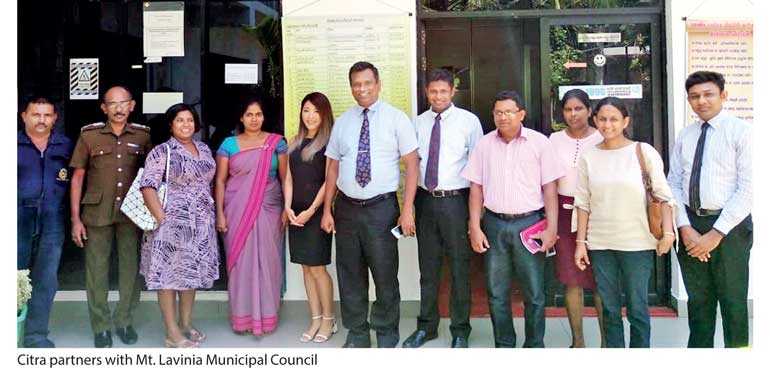Saturday Feb 21, 2026
Saturday Feb 21, 2026
Wednesday, 12 September 2018 00:00 - - {{hitsCtrl.values.hits}}
 Citra, Sri Lanka’s first social innovation lab, recently entered into a partnership with the Mount Lavinia Municipal Council to develop a citizen-centred open source platform for dengue prevention and control.
Citra, Sri Lanka’s first social innovation lab, recently entered into a partnership with the Mount Lavinia Municipal Council to develop a citizen-centred open source platform for dengue prevention and control.
Citra, a joint initiative between the Ministry of Science, Technology, Research, Skills Development, Vocational Training and Kandyan Heritage, and the United Nations Development Programme (UNDP) in Sri Lanka, uses foresight and innovation tools to prototype and test development solutions to ensure they are agile and holistic. Its work is aligned to the national development priorities and works towards bringing in greater citizen engagement to the formulation of development solutions.
One such initiative is developing an open source platform aimed at preventing and controlling the spread of dengue, with technical expertise from the Department of Town and Country Planning, University of Moratuwa. The platform, once developed, will improve local government’s efficiency in identifying, managing and monitoring dengue. It will also have a citizen engagement feature and will allow communities to identify and notify relevant local government authorities of the prevalence and locations of potential mosquito breeding grounds for necessary action. The users can send the exact location along with a picture of the potential breeding ground, following which the application will automatically add the location to a website for local health officials to review.
The system provides a user-friendly, interactive web interface to process and analyse the data near real-time. This will help decision-makers to predict and/or visualise potential risk-prone areas.
Speaking about this collaboration, the Municipal Commissioner of Dehiwala-Mount Lavinia Dhammika Muthugala stated, “With the high prevalence of dengue in our communities, and especially with over 40% of the cases being reported from the Western Province, we need to find innovative initiatives if we are to effectively control and prevent dengue in the future. We believe engaging citizens to assist us in this regard is the most efficient way to curb the spread of dengue.”
A pilot of this application will be tested initially within the Ratmalana Ministry of Health division under the guidance and leadership of Dr. Indika Ellawala, the Chief Medical Officer of the area.
This project is a part of City-i-LEAPS, an initiative implemented in partnership with the Seoul Metropolitan Government and UNDP’s Bangkok Regional Hub, which aims at collaborating with municipalities in countries around the region to develop and assist the implementation of innovative development solutions.
Speaking on the importance of this partnership, Fadhil Bakeer Markar, Partnerships Analyst at the United Nations Development Programme, and Lab Lead a.i. of Citra Social Innovation Lab, stated, “It is imperative that we collaborate with multiple partners if we are to overcome the issues facing our country, and as such, we are pleased to be partnering with the Mount Lavinia Municipal Council, along with our other partners, the University of Moratuwa and the Seoul Metropolitan Government through its City-i-LEAPS project.”